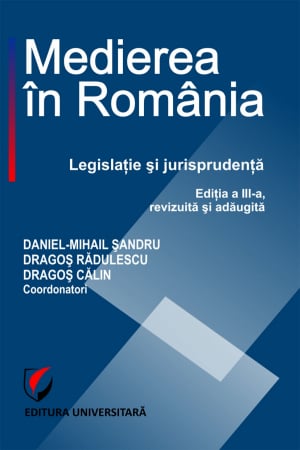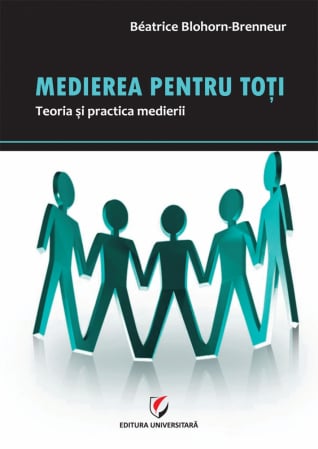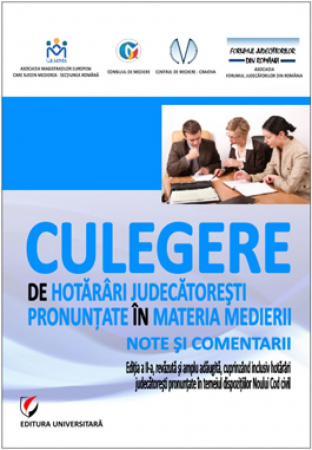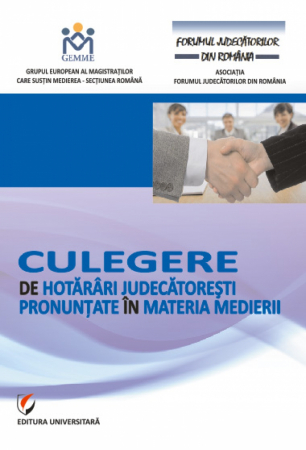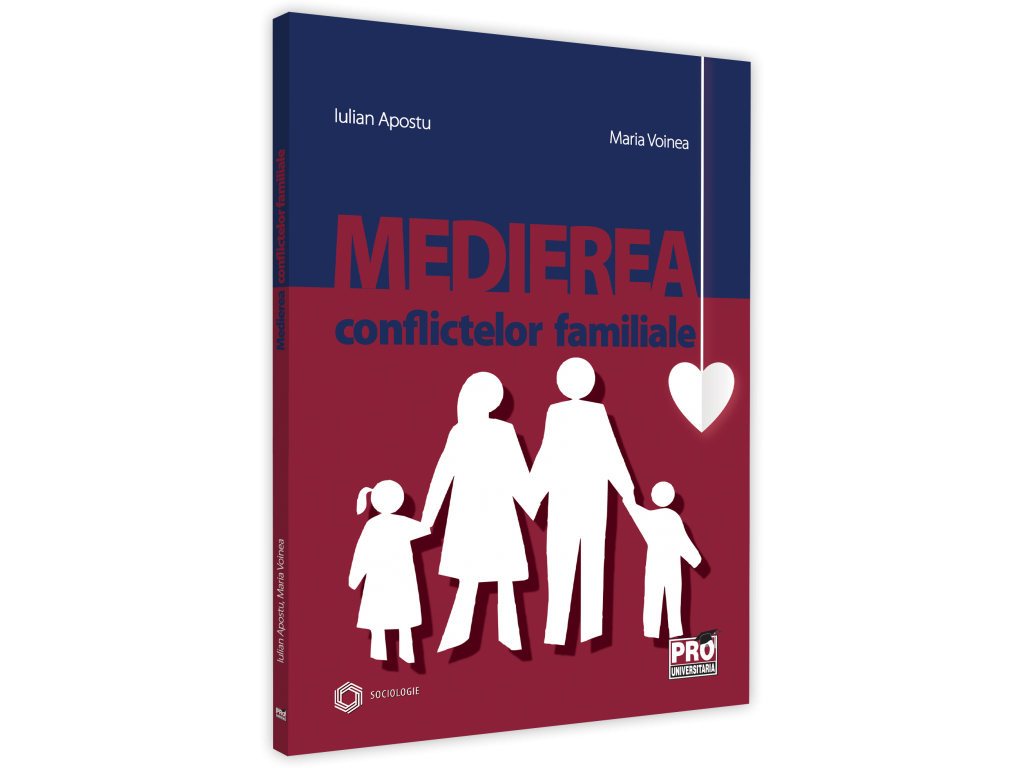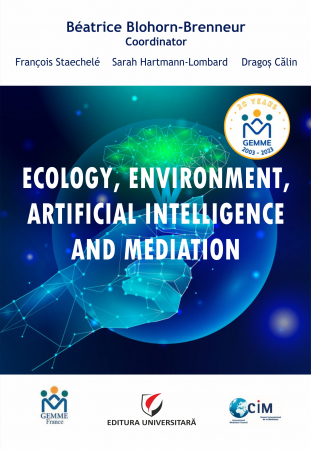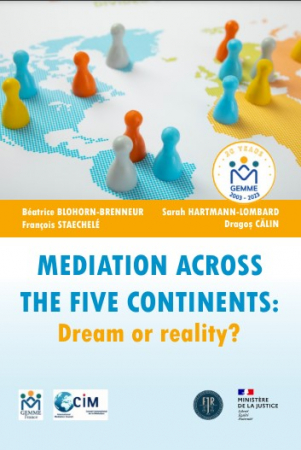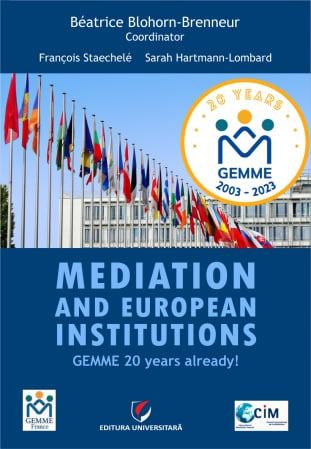ISBN: 978-606-28-0380-3
DOI: 10.5682/9786062803803
Publisher year: 2016
Edition: I
Pages: 202
Publisher: Editura Universitară
Author: Claudiu Augustin Florinel Ignat
- Description
- Download (1)
- Authors
- Content
- More details
- Reviews (0)
The mediation procedure being a non-contentious, extrajudicial procedure, we can define mediation as a non-contentious voluntary procedure, an alternative way of settling disputes, with the help of a third person, neutral and impartial, without decision-making power - the mediator, who is qualified to assist the parties to negotiate, facilitating communication between them and helping them reach a unanimously accepted, efficient and lasting agreement, in conditions of confidentiality.
Mediation can only be voluntary, which is the essence of the procedure. The voluntary character (deriving from the legislative regulations, but also from the principles of mediation) of resorting to mediation is manifested only when it is recommended by the court, and not only, the natural or legal persons in conflict can choose by mutual agreement to solve litigation through mediation.
-
Curs de mediere si arbitraj
Download
CHAPTER I - MEDIATION / 9
1. Means of resolving disputes through mediation in Romania / 9
2. The advantages of mediation / 17
2.1. The advantages of mediation for the citizen / 17
2.2. The advantages of mediation for litigants / 20
2.3. The advantages of mediation for legal practitioners / 25
2.4. The advantages of mediation for magistrates / 28
3. The legal framework in the matter of mediation / 30
4. Principles of mediation / 40
4.1. Voluntary or voluntary nature of the mediation procedure / 41
4.2. Self-determination of parties in mediation / 42
4.3. Confidentiality of the procedure / 42
4.4. The principle of equality of parties and impartiality on the part of the Ombudsman / 44
4.5. The principle of neutrality / 45
4.6. The principle of acceptability / 46
4.7. The principle of prior information of the parties on the procedure / 47
4.8. Non-discrimination / 47
4.9. Conflict of interest / 47
5. Models and styles of cross-border mediation in the family field / 48
6. Special tools and methodologies in the field of cross-border mediation regarding child abduction / 50
7. Access to cross-border mediation in international child abduction by a non-resident parent / 51
7.1. Subjective condition / 52
7.2. Objective conditions / 52
8. Mediation agreement. Content. Executory character. The content of the court decision in case the solution is pronounced on the basis of a mediation agreement / 57
8.1. Mediation agreement. Content / 57
8.2. Enforceability of the mediation agreement / 61
8.3. The content of the court decision in case the solution is pronounced on the basis of a mediation agreement / 70
8.4. Conclusions / 73
9. The mediator / 74
10. Types of mediators / 79
10.1. Legal and professional conditions / 82
11. Mediation procedure / 90
11.1. Information provided by the mediator / 92
11.2. Information provided by persons other than authorized mediators / 93
11.3. Assisting and representing the parties during the mediation procedure / 98
11.4. Stamp duties / 100
12. Closing the mediation / 101
12.1. Concluding an agreement between the parties following the resolution of the conflict / 102
12.2. The finding by the mediator of the failure of the mediation / 104
12.3. Submission / termination of the mediation contract by one of the parties or mediator / 105
13. Mediation training contract / 107
14. The mediation contract / 108
15. Mediation agreement / 114
CHAPTER II - ARBITRATION / 121
1. Arbitration as an institution at the border between non-contentious alternative modalities and administrative litigation / 121
1.1. Object and organization of arbitration in the light of new legislative changes / 121
1.2. Ad-hoc arbitration / 126
1.3. Advantages of ad-hoc arbitration / 128
1.4. Conclusions / 130
2. Special conditions of the arbitration agreement in the administrative relations / 131
2.1. Arbitration Convention / 131
2.2. Termination of the arbitration agreement / 134
3. Arbitration procedure. Particularities / 135
3.1. Speed and expiration / 135
3.2. Referral to the arbitral tribunal / 135
3.3. Judgment / 137
3.4. Characteristics and effects of the arbitral award / 140
4. Institutionalized arbitration / 144
4.1. Notion / 144
4.2. The advantages of institutionalized arbitration / 146
4.3. Disadvantages of institutionalized arbitration / 147
4.4. OSCE Conciliation and Arbitration Convention / 148
4.5. Arbitration institution in other European states / 149
4.6. Short chapter conclusions / 152
BIBLIOGRAPHY / 200
The mediation procedure being a non-contentious, extrajudicial procedure, we can define mediation as a non-contentious voluntary procedure, an alternative way of settling disputes, with the help of a third person, neutral and impartial, without decision-making power - the mediator, who is qualified to assist the parties to negotiate, facilitating communication between them and helping them reach a unanimously accepted, efficient and lasting agreement, in conditions of confidentiality.
Mediation can only be voluntary, which is the essence of the procedure. The voluntary character (deriving from the legislative regulations, but also from the principles of mediation) of resorting to mediation is manifested only when it is recommended by the court, and not only, the natural or legal persons in conflict can choose by mutual agreement to solve litigation through mediation.

6359.png)
![Arbitration and Mediation Course - Claudiu Augustin Florinel Ignat [1] Arbitration and Mediation Course - Claudiu Augustin Florinel Ignat [1]](https://gomagcdn.ro/domains/editurauniversitara.ro/files/product/large/curs-de-mediere-si-arbitraj-641-267406.jpg)
